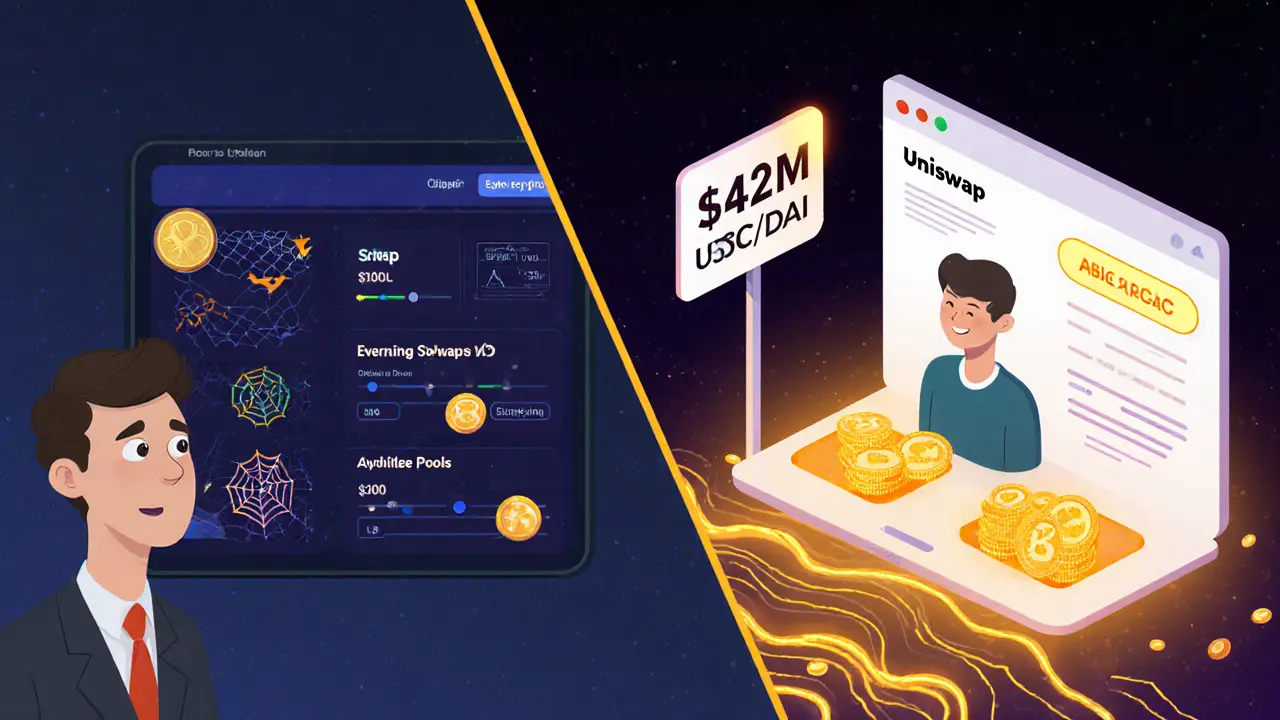Uniswap v2 Slippage Calculator
How Slippage Works
Slippage occurs when a trade moves the price significantly due to low liquidity. This calculator estimates your expected slippage based on the liquidity depth of the pool you're trading.
Important: Tokens with low liquidity (< $10,000) can have high slippage. Always check liquidity depth before trading.
Uniswap v2 on Optimism isn’t the future of decentralized trading - it’s the bridge that got us there. If you’re still using it in November 2025, you’re not behind. You’re just holding onto something that still works, even as everyone else moved on. This isn’t about nostalgia. It’s about understanding why you’d choose it today - and when you should walk away.
Why Uniswap v2 on Optimism Still Exists
Uniswap v2 launched on Ethereum in May 2020. It was the first DeFi protocol to make token swaps simple: no order books, no middlemen, just smart contracts that automatically priced trades. But Ethereum was slow and expensive. Gas fees hit $50 during bull runs. Retail users couldn’t afford to swap $20 worth of tokens. That’s where Optimism came in. Built by the same team that created Uniswap, Optimism is a Layer 2 solution that runs on top of Ethereum. It doesn’t change how Uniswap works - it just makes it faster and cheaper. Uniswap v2 on Optimism went live in July 2021. It kept the same 0.3% swap fee, the same ERC-20 token support, and the same code that had already processed over $1 trillion in trades. By 2025, Optimism’s transaction speed averaged 2.4 seconds. Fees? Between $0.001 and $0.05. That’s 100 to 500 times cheaper than Ethereum mainnet. And because Optimism uses optimistic rollups, it inherits Ethereum’s security. Your funds aren’t safer on mainnet - they’re just slower.How It Works - No Fluff
Uniswap v2 on Optimism is still an Automated Market Maker (AMM). That means trades happen against liquidity pools, not buyers and sellers. If you swap USDC for DAI, you’re trading with a pool that holds both tokens. The price changes based on supply and demand - no human intervention. Here’s what stays the same from Ethereum:- 0.3% fee on every swap (split between liquidity providers)
- All ERC-20 tokens supported
- Same smart contracts audited by OpenZeppelin, Trail of Bits, and Quantstamp
- Same interface - just connect your wallet and swap
- Transactions confirm in seconds, not minutes
- Gas fees are pennies, not dollars
- You need to bridge your ETH or tokens from Ethereum mainnet first
- Network Name: Optimism Mainnet
- New RPC URL: https://mainnet.optimism.io
- Chain ID: 10
- Symbol: ETH
- Block Explorer URL: https://optimistic.etherscan.io
What You Can Trade
As of October 2025, Uniswap v2 on Optimism supports 287 tokens and 412 trading pairs. That’s more than Uniswap v3 on Optimism - but don’t be fooled. Uniswap v3 has 64 coins and 181 pairs. Why? Because v3 is designed for efficiency. It lets liquidity providers focus their funds in narrow price ranges. v2 spreads liquidity evenly across the entire price curve. That means more tokens are listed on v2 - but many of them have tiny pools. For example:- USDC/DAI: $42 million in liquidity (low slippage, great for swaps)
- WETH/USDT: $28 million
- PEPE/USDC: $110,000
- Some obscure tokens: under $1,000

How It Compares to Uniswap v3 on Optimism
This is the real question. Why not just use v3? It’s the newer version. It’s the future. But v2 still has uses.| Feature | Uniswap v2 | Uniswap v3 |
|---|---|---|
| Liquidity Model | Spread across entire price range | Concentrated in custom price ranges |
| Fee Tiers | Fixed 0.3% | 0.05%, 0.3%, 1% |
| Capital Efficiency | 8.3x less efficient than v3 | Uses less capital for same volume |
| Slippage (Stablecoins) | 22% lower than SushiSwap | Similar or slightly better |
| Slippage (Volatile Tokens) | 37% higher than v3 | Best execution for wild swings |
| Learning Curve | Simple - just swap | Complex - pick price ranges |
| Market Share (Optimism DEX) | 12.7% | 68.3% |
Who Should Use It Today?
You should use Uniswap v2 on Optimism if:- You’re new to DeFi and want a simple swap interface
- You’re trading stablecoins (USDC, DAI, USDT) with low slippage
- You’re holding a token that hasn’t been added to v3 yet
- You don’t want to manage price ranges or fee tiers
- You’re providing liquidity - you’re leaving money on the table
- You’re trading volatile tokens - slippage will hurt you
- You need fast withdrawals - Optimism’s 7-day challenge period still applies
- You’re trying to save on fees - v3 is just as cheap and more efficient
Common Problems and How to Fix Them
People who use Uniswap v2 on Optimism run into the same issues. Here’s what happens - and how to fix it. “My transaction failed with ‘INSUFFICIENT_OUTPUT_AMOUNT’”This is the #1 error. It means the price moved too much between when you clicked swap and when it executed. Solution: Increase your slippage tolerance to 1.5% or 2%. For stablecoins, 0.5% is fine. For memecoins? Go to 3%. “I bridged my ETH but it’s not showing up”
Wait. The Optimism bridge takes 7-10 minutes. If it’s been 20 minutes and nothing’s there, check Optimistic Etherscan with your wallet address. If the transaction shows as confirmed, restart your wallet or switch networks. “I don’t have ETH on Optimism to pay gas”
You need ETH to pay for transactions on Optimism. But you can’t use ETH from Ethereum mainnet. You must bridge at least 0.01 ETH to Optimism first. Many users forget this and think their tokens will cover gas. They won’t. “The interface is confusing”
Uniswap’s website assumes you know what a wallet is. If you’re lost, watch a 5-minute YouTube tutorial titled “How to Use Uniswap v2 on Optimism.” It’s not hard - you just need someone to show you the buttons.
The Future: Is This Still Worth It?
Uniswap Labs announced in September 2025 that they’ll offer incentives to move from v2 to v3 through Q1 2026. You’ll get 0.05% extra fee revenue if you migrate your liquidity pools. That’s a clear signal: they’re winding it down. Optimism’s upcoming Cobalt upgrade in Q2 2026 will cut the 7-day withdrawal delay to seconds. That’s good news for everyone - but it won’t bring v2 back. v3 will still be better. It’s more efficient, more flexible, and already has the market. By 2027, experts predict v2 will handle less than 3% of Optimism’s DEX volume. It won’t disappear. But it will become a footnote - like dial-up internet. Still functional. Still used by a few. But no one’s building new stuff on it.Final Verdict
Uniswap v2 on Optimism isn’t broken. It’s just outdated. If you’re swapping USDC for DAI and paying $0.002 in fees? That’s a win. If you’re trying to earn passive income as a liquidity provider? You’re doing it wrong. Use it for simple swaps. Avoid it if you’re serious about DeFi. The future is v3. But v2? It’s still the easiest way to get started.Is Uniswap v2 on Optimism safe to use?
Yes. The smart contracts are the same ones audited by OpenZeppelin, Trail of Bits, and Quantstamp in 2020. They’ve processed over $1.2 trillion in trades across all networks. The only risk is using a poorly managed liquidity pool with less than $1,000 - that’s where slippage becomes dangerous. The Optimism network itself is secure because it’s anchored to Ethereum.
Can I still earn fees on Uniswap v2 on Optimism?
Yes, but you’re leaving money on the table. Liquidity providers on v2 earn the same 0.3% fee per trade as v3, but because v2 spreads liquidity across the whole price range, it needs 8.3x more capital to match v3’s trading depth. That means your returns are much lower. Most experienced users migrated to v3 in 2023 and now earn 3x more with the same tokens.
Do I need to bridge my tokens to use Uniswap v2 on Optimism?
Yes. You must move your ETH or tokens from Ethereum mainnet to Optimism using the official Optimism Bridge. You can’t connect MetaMask to Optimism and swap directly. The bridge takes 7-10 minutes and costs a few cents in gas. You also need at least 0.01 ETH on Optimism to pay for future transactions.
Why are there so many tokens on v2 but so few trading pairs?
v2 allows any ERC-20 token to be added to a pool by anyone. That’s why there are 287 tokens. But for a trading pair to be useful, someone must provide liquidity on both sides. Most tokens have only one side - like USDC/PEPE - but no PEPE/USDC. That’s not a real pair. Only pairs with deep liquidity on both sides are worth trading. v3 reduces this problem by focusing on high-volume pairs.
Will Uniswap v2 on Optimism be shut down?
No. It will remain operational indefinitely. But Uniswap Labs is no longer updating it. All new features go to v3. As liquidity migrates, v2 pools will become thinner and less reliable. It won’t disappear - it’ll just become a relic for users who don’t want to learn v3.
What’s the biggest mistake people make using Uniswap v2 on Optimism?
They assume low fees mean they can trade any token safely. That’s not true. A token with $500 in liquidity might have a 20% slippage on a $100 trade. That’s a $20 loss before the trade even executes. Always check the liquidity depth before swapping. If it’s under $10,000, think twice.

